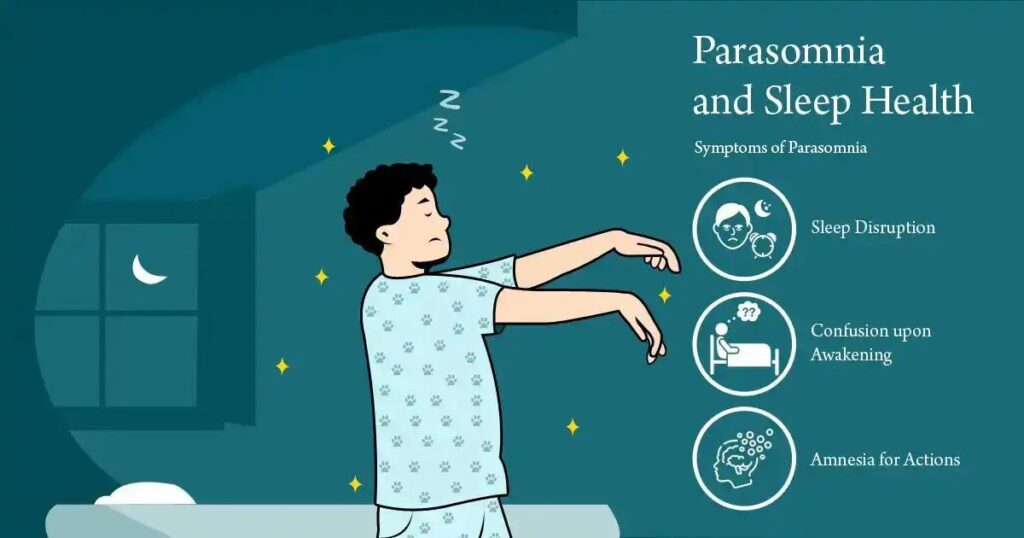Understanding Parasomnia: The Hidden World of Sleep Disorders
Parasomnia, a term coined by the American Academy of Sleep Medicine (AASM), refers to a group of sleep disorders that involve abnormal movements or behaviors during sleep. These disorders are often characterized by vivid dreams, hallucinations, and other strange occurrences that can be alarming and distressing for both the individual experiencing them and their loved ones.
What is Parasomnia?
Parasomnia is a type of sleep disorder that can occur during any stage of sleep, including non-rapid eye movement (NREM) sleep, rapid eye movement (REM) sleep, or even during the transition between these stages. The term “parasomnia” is derived from the Greek words “para,” meaning “beside” or “beyond,” and “somnium,” meaning “sleep.”
Types of Parasomnia
There are several types of parasomnia, each with its own unique characteristics and symptoms. Some common forms of parasomnia include:
- Sleepwalking (Somnambulism): A condition in which an individual gets up and walks around while still asleep, often performing complex tasks such as dressing, eating, or even leaving the house.
- Sleep talking (Somniloquy): A condition in which an individual talks out loud while asleep, often using nonsensical words or phrases.
- Sleep terrors (Night terrors): A condition in which an individual experiences intense fear and anxiety while asleep, often accompanied by screaming, thrashing, or other violent behaviors.
- Sleep eating (Sleep-related eating disorder): A condition in which an individual eats food while asleep, often unaware of what they are consuming.
- Sleep sex (Sleep-related sex disorder): A condition in which an individual engages in sexual activities while asleep, often without conscious awareness.
Causes and Risk Factors
While the exact causes of parasomnia are not fully understood, research suggests that several factors may contribute to the development of these disorders. These include:
- Genetic predisposition: Some individuals may be more prone to developing parasomnia due to their genetic makeup.
- sleep disorders: Conditions such as insomnia, sleep apnea, and restless leg syndrome may increase the risk of developing parasomnia.
- Stress and anxiety: High levels of stress and anxiety can disrupt normal sleep patterns and increase the likelihood of parasomnia.
- Medications: Certain medications, such as sedatives and antidepressants, can disrupt sleep patterns and increase the risk of parasomnia.
Diagnosis and Treatment
Diagnosing parasomnia can be challenging, as individuals often have no memory of the events that occurred during sleep. However, healthcare providers may use various methods to diagnose parasomnia, including:
- Clinical evaluation: A healthcare provider will conduct a thorough physical examination and review medical history to rule out other sleep disorders.
- Sleep study: A sleep study may be conducted to monitor brain activity, heart rate, and other physiological measures during sleep.
- Behavioral observations: Loved ones may be asked to observe and report any unusual behaviors that occur during sleep.
Treatment for parasomnia typically involves addressing underlying causes and using behavioral therapies to manage symptoms. In some cases, medications such as benzodiazepines may be prescribed to help reduce symptoms.
Conclusion
Parasomnia is a complex and multifaceted condition that can have a significant impact on an individual’s quality of life. While there is still much to be learned about this condition, researchers and healthcare providers are working to develop effective treatments and improve understanding of its underlying causes. By recognizing the signs and symptoms of parasomnia and seeking medical attention, when necessary, individuals can take steps to manage their symptoms and improve their overall well-being.
References
understandingparasomnia_web.pdf (aasm.org)
Sleep Disorder – StatPearls – NCBI Bookshelf (nih.gov)
Websites:
Britmed Healthcare: https://britmedhealthcare.co.uk/
Nightingale Hospital: https://www.nightingalehospital.co.uk/
Top Doctors: https://www.topdoctors.co.uk/doctor/ahmed-el-missiry
You can also book, Contact us on WhatsApp 08009708017




